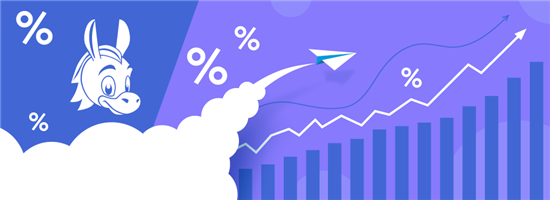Percent Review
You can earn money in most alternative assets, but it's often locked in for years. Percent offers a faster option with the same returns.
Overall Score | 4.1 | ||
Minimum Deposit | 4.0 | ||
Commissions and Fees | 4.5 | ||
Customer Service | 3.0 | ||
Ease of Use | 4.5 | ||
Liquidity | 4.5 | ||
Pros and Cons
- High returns
- Short holding period
- Intuitive platform
- High risk
- Complex asset
- Accredited investors only
Bottom Line
Legit platform to invest in private credit deals
Private credit, valued at $1.4 trillion in 2023, is projected to grow even more (to $3.5 trillion) by 2028.[1] Historically, the only ones benefiting from this boom are the institutions.
With Percent, retail accredited investors get a chance to participate in this market.
But should you really invest in private credit?
In this review, find out how much you can earn with Percent, how to get started, and if it's safe and legit.
What Is Percent?
Percent is a private credit investment platform. At Percent, retail accredited investors get access to short-term but high-yielding offerings uncorrelated to the stock market.
The minimum investment may vary, but it can start at $500.[2] However, only U.S. accredited investors with U.S. bank accounts can participate.
Percent, formerly known as Cadence, was founded by Nelson Chu in 2018. As of January 2024, it already has over $1 billion in transaction volume.[3]
You're considered an accredited investor if:[4]
- Your net worth is over $1M
- You earn more than $200,000 annually
- You have the Series 7, Series 65, or Series 82 license
- You're considered expert employees and executives in financial markets
How Does Percent Work?
 |
Percent connects you to entities that need funding through the note it offers. It bridges the gap between retail investors who want to lend money and entities that want to borrow.
There are four main offerings in Percent:
- Asset-Based Securities
These are notes that are based on the cashflows of an existing asset. Those assets can be categorized into two: Small and Medium Sized Business (SMB) Financing and Consumer Loans and Consumer Advance.SMB Financing includes business loans, merchant cash advances, SMB leases, discounted receivables, etc.
Consumer Loans and Advances include mortgages, personal loans, pay-later installment loans, student loans, credit cards, payday advances, litigation finance, etc.
- Corporate Loans
This asset class is composed of cash-flow lending and venture debt. Cash-flow lending consists of loans to established companies with predictable cash flows.On the other hand, venture debt is debt financing for venture-backed companies that want to increase their equity.
- Limited Partner Investing
A private fund that is managed and set up by a General Partner (GP), just like a hedge fund. - Blended Notes
Automatically diversified note that gives you exposure across all of Percent's existing deals.
At Percent, you can either select a specific deal or you can opt for the Blended Notes to automatically diversify your investments.
Earning Money With Percent
Investing in Percent's platform is very simple and intuitive. You just need to select, buy, and hold your note.
Earn here in 3 ways depending on the product you select:
- Interest Payment
Get the interest payment on your capital once an individual deal successfully matures or ends. - Blended Notes
Receive monthly coupons for a year, then receive your amortizing principal plus interest payments if you invest in Blended Notes. - LP Investments
Receive passive income based on the earnings of the GP's managed fund if you invested as a Limited Partner.
You don't need to monitor your deals all the time. Simply wait for the scheduled interest payment.
Fees
Percent does not charge any fee when you buy an offering. It does, however, charge a 10% fee every time you receive your earnings.[5]
For example, if your offering has a 15% APY, Percent gets 1.5%, and then you're left with 13.5%. The fee depends on when you get your money, so frequency can be monthly, quarterly, or annually subject to the investment terms.
But take note, if you invested in Blended Notes, you would need to pay an additional management fee of 1%.[6]
Just remember: Percent does not get paid if you don't get paid.
How Much Money Can You Make in Percent?
Percent has an 17.91% average APY and a 9.81-month investment term on average as of October 31, 2024.[7]
So, with $1,000 in capital, you could potentially get around $135 as profit in 9 months. If fees are considered, it will be around $122.
However, it's important to know that it has a loss rate of 2.04% and a default recovery rate of only 19.86%. Basically, you can still lose money. Your gains depend on how well you diversify your portfolio.
After the interest rate increases in 2022, many traditional lenders have exited the market. This forced borrowers to look for alternative lending options, in this case, private lenders.[8]
Withdrawing Profits
Compared to other alternative assets like real estate and fine art, private credit tends to be short-term and somewhat liquid. So, even if you need to hold your investments, you earn a profit in less than a year, unlike real estate or fine art, which takes 3-5 years.
The cash flow will depend on the investment you choose. Blended Notes have monthly payments, while some individual offerings have to follow the maturity date.
Pros and Cons
Pros
- Short holding period
- High returns
- Intuitive platform
- Detailed tutorial blogs
Cons
- Complex asset
- Limited to U.S. users
- For accredited investors only
- May lose entire capital in default
Is Percent Worth It?
Yes, if you understand the risks involved. Private credit as an asset has been steadily growing for a reason. It can be profitable.
Percent is an alternative investment platform open to retail investors that specializes in private credit. That in itself already makes it worth trying.
Plus, the fees for transacting with Percent are also pretty reasonable compared to other alternative asset platforms.
However, for those who find private credit too complex and are not able to diversify deals, it's best to avoid this platform.
How to Invest in Percent
If you want to start investing in Percent, simply follow these steps:
- Create an account
If you're an accredited investor in the U.S., sign up for an account. After that, verify your identity. - Fund your account
Deposit money through wire transfers or ACH. Wire transfers can take a day to process, while it can be up to 5 days for ACH. - Choose a deal and invest
Look for deals that are still in the funding stage. Bid an amount and preferred APY. Then, wait for it to be filled.
Verifying your investor accreditation could take up to ten minutes, but identity verification can take up to forty-eight hours.
Offers in Percent tend to be oversubscribed, which can result in you not being able to participate in the deal. For a higher chance of getting in the deal, Percent suggests bidding a lower minimum APY and leaving the minimum investment amount untouched.
Is Percent Safe/Legit?
Percent is a legitimate investment platform, but it isn't your typical security. It's exempt from SEC registration as it only accepts accredited investors as clients.
With that being said, there are still some infrastructure to minimize your risk.
- Special Purpose Vehicle
Even if Percent stops operating, your funds are safe in a bankruptcy-remote entity called a Special Purpose Vehicle (SPV). SPVs are typically used in finance to separate a specific investment from the main company's assets. - Overcollateralization
Borrowers are required to provide enough collateral to cover both the original note amount and potential losses if there is a default. - Due Diligence on Borrowers
Each potential borrower's operational and financial capacity is extensively reviewed to uncover possible counterparty risks.
Despite these safeguards, you must still exercise caution while investing as all investments carry risk.
Types of Accounts
There are 3 types of accounts on Percent: individual account, IRA account, and institutional account.
If you choose to invest through a self-directed IRA, the minimum investment is $2,500.[9]
You need to send an email to ir-syndication@percent.com with the name of the offering and the allocation amount if you will be investing through a custodian.
Customer Service
Phone: 646 876 5141
Email: hello@percent.com
Ticket: Send a support ticket on their website
Their business hours are from Monday to Friday (9:30 AM - 5:30 PM ET). You can also browse through the FAQ section for common queries.
Customer Feedback
Maybe because the platform is exclusive to accredited investors only, there aren't many online reviews from their clients. However, there is some interesting feedback on both the good and bad sides of Percent on Reddit.
Here are some of the positive reviews:
- MousseMysterious7148, Jan 2023
- doublea3, May 2023
While here are the negative ones:
NEVER invest with Percent. You better of with S&P or Nasdaq ...
- chiru2021, September 2024
- Rude_Crazy_2393, Jan 2024
How It Compares
Percent | Masterworks | Yieldstreet | |
|---|---|---|---|
| Annual Fee | 1.5% (plus 20% of future profits) | 1.5% management fee for the Alternative Income Fund; Fees vary for individual investment offerings (usually 1-2%) | |
| Minimum Deposit | $10,000 minimum for the Alternative Income Fund; Individual investment offerings typically starts at $10,000 | ||
| Investment Types | Residential & commercial real estate, sports car leasing, art financing, marine vessels and deconstruction, supply chain financing, litigation financing | ||
| Accredited Investor Requirements | None for the Alternative Income Fund; Must be accredited investor for individual investment offerings | ||
| Dividends | Alternative Income Fund pays dividends quarterly; can choose to auto-invest or cash payout | ||
| Investment Period | 5 years for Alternative Income Fund (with opportunities to liquidate on a quarterly basis); Varies for individual offerings | ||
| Learn More | Learn More | Visit Site |
Percent is the only platform that specializes in private credit, but it's not the only alternative asset platform out there.
Percent vs. Masterworks
Percent deals with private credit while Masterworks offers fine art. Unlike Percent, Masterworks is open even to non-accredited investors.
However, Masterworks has a higher minimum investment of $15,000,[10] considerably greater than Percent's $500.
Masterworks also tends to be more illiquid than Percent. Percent's deals usually mature within a year, but artworks in Masterworks are held for 3-10 years. Masterworks has a secondary market, but filling in your sell order still depends on the availability of buyers.
All investments carry a certain level of risk, but artworks, especially blue-chip artworks, are safer assets than private credit in general. In art, it's rare to see a 100% loss unless the artwork is mishandled or the artist loses its credibility.
Percent does not have any fees and will only charge 10% on each advertised interest payment, while Masterworks has a 1.5% annual management fee and 20% profit share on the sale of the painting.[11]
Percent vs. YieldStreet
Percent specializes in private credit while YieldStreet is basically a marketplace for anything alternative, although YieldStreet still offers some private credit investments like consumer loan portfolios.
Percent allows you to customize your portfolio by giving access to specific loan deals, while YieldStreet mostly has fund-like offers.
At YieldStreet, you don't have to be an accredited investor to start. However, it requires a higher minimum of $10,000.[12] In Percent, it's only $500.
The holding period and frequency of interest payment varies per product in YieldStreet. It can be annual, quarterly, or monthly.
However, since most funds offered in YieldStreet are automatically diversified, your risk is minimized. In Percent, that option is equal to the Blended Notes.
Online Alternative Investments
- Exclusive access to private market investments
- Wide range of alternative investments like art, real estate, legal financing, and more
- Goal-based investing for growth or income
- Minimums starting from $10,000
Why Should You Invest in Private Credit?
Here are some reasons why you should invest in private credit:
- Potential high returns
The current weighted average APY of Percent is usually higher than other financial instruments. It's well over 10%, which is the 10-year average return of the US stock market. - Faster term
Despite the potential high returns, the investment time in private credit is relatively short. You don't have to wait for years to exit. In some cases, the term can be as short as 3 months. On average, Percent deals have a maturity of 9 months. - Diversification
Private credit is not directly affected by changes in the stock market, which makes it ideal for diversification.
Risks of Private Credit Investing
Private credit may be attractive due to the potential high returns and shorter investment periods, but it's not without its risks.
The biggest risk in private credit is if your borrower can't afford to make their payments and ends up in default. The collateral backs your capital, but the recovery process can take a long time, and there are different priorities for who gets paid first.
Another thing to consider is the risk that your investment platform goes bankrupt. If Percent shuts down, a third party will process that deal until maturity thanks to the SPV nature of each offering.
Lastly, you need to consider the economic scene. If the public lending environment eases, then borrowers can just directly transact with traditional bank lenders, which could lower the demand for private lending.
Bottom Line
Overall, Percent is a great platform for accredited investors who want to get into private credit. You can get high returns in a short period.
However, with high returns comes high risk. There can be instances where you lose money if the borrower defaults. However, by properly diversifying, you might be able to offset the losses with the gains of other assets.
References
- ^ Blackrock. Private Debt: a primer, Retrieved 02/18/2024
- ^ Percent. FAQ: What is the minimum amount of money I can invest?, Retrieved 03/20/2024
- ^ Percent. About Percent, Retrieved 03/20/2024
- ^ U.S. Securities & Exchange Commission. Accredited Investor, Retrieved 02/18/2024
- ^ Percent. FAQ: Are there fees to invest on the Percent platform?, Retrieved 03/20/2024
- ^ Percent. Blended Notes, Retrieved 03/20/2024
- ^ Percent. Our Track Record of Performance, Retrieved 11/11/2024
- ^ S&P Global. Private credit boom continues; pressure builds on Europe's debt market, Retrieved 02/18/2024
- ^ Percent. Investing through an IRA Custodian on Percent, Retrieved 03/20/2024
- ^ Masterworks. FAQ: Is there a minimum investment for Masterworks?, Retrieved 03/20/2024
- ^ Masterworks. FAQ: What are the fees associated with Masterworks?, Retrieved 03/20/2024
- ^ Yieldstreet. Alternative Investments, Retrieved 03/20/2024
Write to Stella Magay at feedback@creditdonkey.com. Follow us on Twitter and Facebook for our latest posts.
Note: This website is made possible through financial relationships with some of the products and services mentioned on this site. We may receive compensation if you shop through links in our content. You do not have to use our links, but you help support CreditDonkey if you do.
|
|
|









